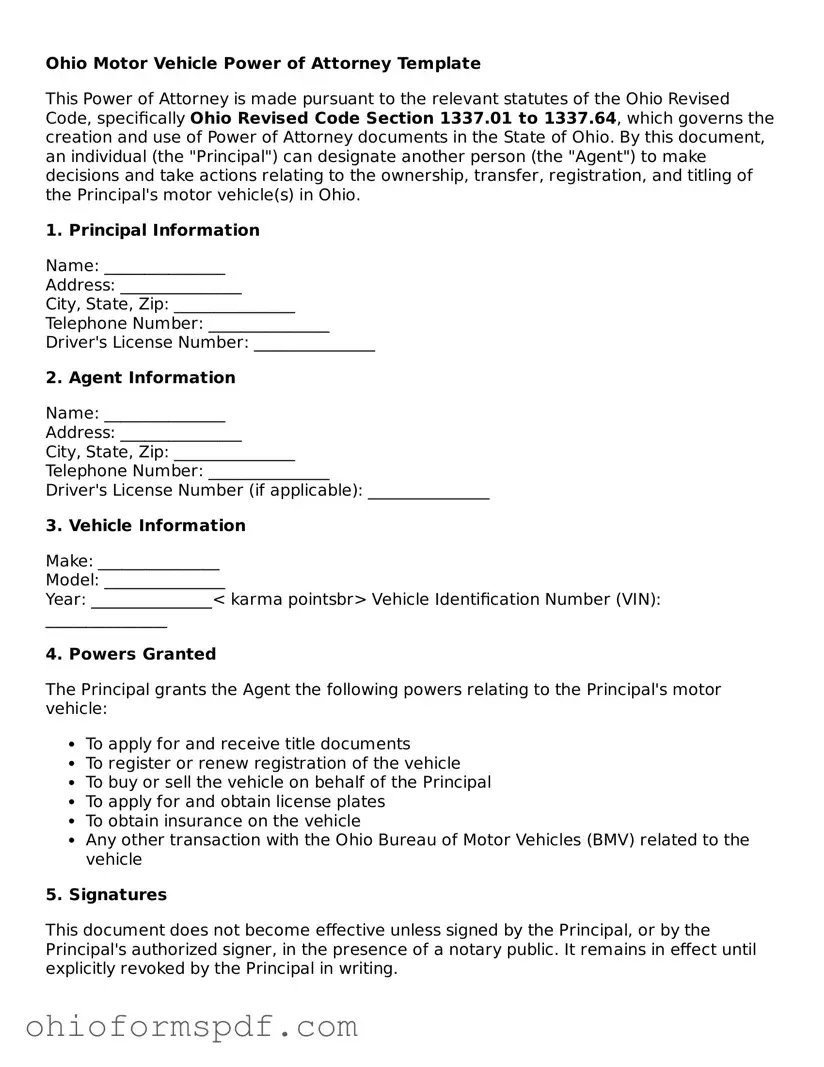The General Power of Attorney form, like the Ohio Motor Vehicle Power of Attorney, authorizes a person to act on someone else’s behalf. However, it is broader, allowing the agent to make decisions across a wide range of matters, not just those related to a vehicle. This similarity lies in the foundational concept of granting authority to another, although the scope of that authority is what differentiates them.
The Durable Power of Attorney for Health Care is another document bearing resemblance to the Ohio Motor Vehicle Power of Attorney. This form designates someone to make healthcare decisions on behalf of another, should they become unable to do so. Both documents operate on the principle of delegation of decision-making authority, despite the different domains—healthcare versus vehicle matters.
The Limited Power of Attorney is particularly akin to the Ohio Motor Vehicle Power of Attorney, as it grants authority to act in specific situations. The key difference is that the limited power can apply to any area designated by the principal, such as financial or real estate transactions, while the Motor Vehicle Power focuses exclusively on vehicle-related tasks.
The Real Estate Power of Attorney shares the feature of allowing someone else to handle certain affairs, specifically related to property transactions. Similar to the Motor Vehicle Power of Attorney, it facilitates handling complex matters by an appointed agent, though its focus is strictly on real estate, contrasting with the vehicle-centric nature of the latter.
A Financial Power of Attorney, much like the Ohio Motor Vehicle Power of Attorney, empowers another person to manage financial affairs. This can include buying or selling assets and managing bank accounts, whereas the Motor Vehicle Power of Attorney is strictly limited to actions concerning a vehicle. Both documents streamline the process of managing specific types of transactions through trusted individuals.
The Springing Power of Attorney is characterized by its activation upon the occurrence of a specified event, usually the principal's incapacity. It shares with the Ohio Motor Vehicle Power of Attorney the theme of appointing someone else to make decisions, though differs in its conditional activation feature, contrasting with the generally immediate effect of vehicle power of attorney forms.
The Parental Power of Attorney allows parents to authorize another adult to make decisions concerning their child’s welfare, including education and health care, in their absence. It parallels the Ohio Motor Motor Vehicle Power of Attorney in empowering another on one’s behalf, albeit in the context of child guardianship rather than vehicle management.
The Business Power of Attorney designates an individual to act in business-related matters, which can range from operational decisions to financial transactions. Similar to the Ohio Motor Vehicle Power of Attorney, it concerns assigning authority to act on one’s behalf, though within the commercial sector, showcasing the versatility of power of attorney documents in various fields.
A Tax Power of Attorney allows an individual to authorize someone, typically a tax professional, to handle their tax matters and represent them before the tax authorities. Like the Ohio Motor Vehicle Power of Attorney, it specializes in a specific area, highlighting the strategic delegation of authority to navigate complex systems, in this case, the tax system versus motor vehicle matters.
Lastly, the Advanced Directive, or Living Will, directs medical care preferences in the event of incapacity. While fundamentally focused on health care decisions, it shares with the Ohio Motor Vehicle Power of Attorney the vital aspect of preparing for situations where one cannot make decisions personally, although it serves a distinctly different purpose in the scope of personal preparation and autonomy.

